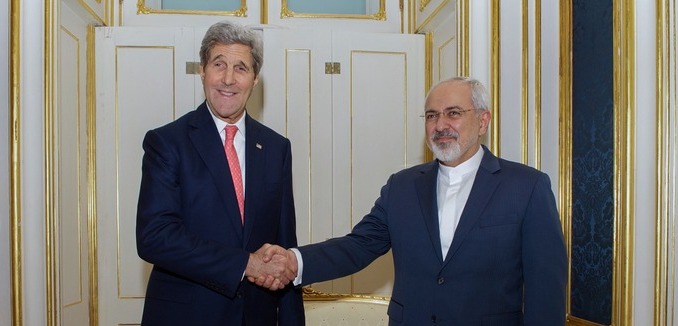In the wake of this weekend’s escalation between Saudi Arabia and Iran, Washington seems to be increasingly favoring Tehran over Riyadh, Josh Rogin and Eli Lake reported for Bloomberg View on Monday.
After Shiite cleric Nimr al-Nimr was executed in Saudi Arabia on terrorism-related charges on Saturday, Rogin and Lake wrote that the State Department expressed concern that the Saudis were “exacerbating sectarian tensions.” Secretary of State John Kerry called Iranian Foreign Minister Mohammad Javad Zarif soon afterwards– before contacting his Saudi counterpart– and asked him to help calm things down. Later, State Department spokesman John Kirby seemed to contest the Saudis’ claims that the Iranian regime was culpable for the embassy attack by saying that Iran had arrested some of those involved. (The Saudis claim that after being informed of the threat of assault on the embassy, Iran waited more than 12 hours before sending security to protect the besieged diplomats.)
While the State Department insisted that it was not taking a side in the feud, Rogin and Lake reported that diplomats from the United States and the Arab world say that America’s Gulf allies see a decided tilt towards Iran.
According to Rogin and Lake, the American response to the heightened tensions between Saudi Arabia and Iran has aggravated a perception that the Obama administration is aligning with Tehran, which is fueled by Washington’s treatment of the Islamic Republic under the nuclear deal. They wrote:
At the root of the problem for Sunni Arab states is the nuclear deal reached last summer by Iran and Western nations. When the White House sold the pact to Congress and Middle Eastern allies, its message was clear: Nothing in the deal would prevent the U.S. from sanctioning Iran for non-nuclear issues. Yet that has not been the case.
To illustrate this concern, Rogin and Lake noted that when Tehran complained at the end of last year that it was excluded from a visa waiver program, Kerry personally wrote Zarif a letter assuring him that the administration was prepared to issue waivers to anyone who had visited Iran, which would allow them to enter the U.S. without restrictions. After the administration planned to impose new sanctions on Iran for its illicit ballistic missile test in October, which a United Nations panel found had violated a U.N. Security Council resolution, it backed off from implementing them indefinitely in response to pressure from Iran.
In addition, Iran’s sentencing of Washington Post reporter Jason Rezaian and arrest of Siamak Namazi, an American-Iranian dual national, led to no greater public friction between Washington and Tehran. The White House also pushed for closing the International Atomic Energy Agency’s investigation into Iran’s past illicit nuclear research, even though the agency had found that the Islamic Republic was working on developing a nuclear weapon more recently than previously thought.
In explaining the administration’s tilt towards Tehran, Aaron David Miller, a former Middle East peace negotiator and current vice president at the Woodrow Wilson International Center for Scholars, told Rogin and Lake that the White House sees Iran as a stabilizing force in the Middle East. Thus, according to Miller, “the Iranians hold the Obama legacy in their hands.” He added, “We are constrained and we are acquiescing to a certain degree to ensure we maintain a functional relationship with the Iranians.”
Rogin and Lake observed that without Washington acting to confront Iran’s aggression, Saudi Arabia feels the need to do so itself, as “if Obama won’t punish Iran, Saudi Arabia will.”
In April, Miller wrote about the dynamic currently being played out:
It clearly makes sense to try to use diplomacy as a way to constrain Iran’s nuclear program. But we should have no illusions about two things. First, we won’t end Teheran’s nuclear weapons pretensions, and two, we are and will be enabling its rise in the region because of this nuclear diplomacy, not constraining it.
[Photo: UNVIE U.S. Mission To International Organizations in Vienna / Flickr ]




